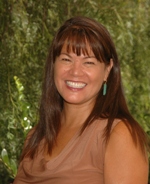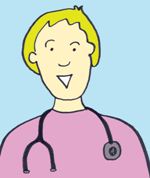Graphic Medicine: Using Comics to Educate Patients, Share Experiences

Graphic novels serve as unique patient education tools and methods of expression
By Megan Murdock Krischke, contributor
A creative new tool is being brought into the realm of health care and has benefits for patients, caregivers and health care providers alike. The tool: comics, or the graphic novel. In this scenario, the genre is less about humor and more about patient education and sharing health-related experiences.
“There are a number of answers to why comics, or graphic novels, are so useful in a health care setting,” began M.K. Czerwiec, RN, MA, artist-in-residence at Northwestern University’s Feinberg School of Medicine in Chicago. “One that is on my mind now is that they use story. People can relate to a story and it helps integrate complex information--story helps get the message across if it is done right.”
“Comics are visual and textual, so that helps with accessibility,” Czerwiec continued. “And it is appealing. There is the way it feels to read a graphic novel; we read them as kids, we feel safe with comics, even though a lot of the material deals with difficult things, it can feel safe as a format. Additionally, there is some evidence that it can help with language and literacy barriers.”
 "Gaps" from Tangles: A Story About Alzheimers, My Mother and Me, page 70, by Sarah Leavitt. Used with permission.
"Gaps" from Tangles: A Story About Alzheimers, My Mother and Me, page 70, by Sarah Leavitt. Used with permission.
“Comics can give multiple perspectives, even on one page sometimes,” added Juliet McMullin, PhD, associate professor of anthropology at University of California, Riverside. The power of text and images together gives people so much more to think about--there is something to being able to see people’s experiences in relation to objects and other people.”

Juliet McMullin, PhD, associate professor of anthropology, says comics in medicine offer a depth of understanding and perspectives that plain text often can't.
“Comics are more than just informational and getting out the public health information,” she continued. “A lot of people think of comics as ‘dumbing down’, but it actually opens up the world and shows things from a different perspective. It is a serious genre that has a lot of potential.”
Patient education is one aspect of this larger field called graphic medicine, but it also goes beyond that. Many graphic novels are autobiographical in nature--the author reflecting on their experience of illness or caregiving. These types of novels can help patients and caregivers to have a deeper understanding of what they are going through and to feel less alone.

MK Czerwiec, RN, MA, a.k.a. The Comic Nurse, says that drawing can be therapeutic for patients and caregivers. Image used with permission from
comicnurse.com.
While comics can address a broad range of medical experiences, Czerwiec noted that there is currently a lot of material focusing on diabetes, mental health issues, cancer, and elder care/dealing with aging parents. “These novels aren’t just useful for patients, but also for health care professionals. Reading them gives professionals a deeper understanding of their patients and what their lives and their experience of illness are beyond the hospital. And they are much more engaging that a plain text explanation might be.”
“Another benefit graphic novels are bringing to health care professionals is a way to unpack their experience as providers, which can be emotional and complex,” she continued. “There are things we learn by drawing that we don’t learn by thinking or writing. At the end of my book, The Graphic Medicine Manifesto, there is a chapter, ‘The Crayon Revolution,’ where I help providers think through how they can use drawing as a way of processing and coping with the more difficult realities of their work…You might be surprised at what drawing will open up for you.”
Graphic medicine conference and resources
McMullin and Czerwiec are both organizers of the 6th International Conference on Comics and Medicine that will be held July 16-18, 2015 at University of California, Riverside.
“The conference attendees are a very multidisciplinary and very welcoming group. There are a number of nurses involved and I’d love to have more nurses join us this year,” stated Czerwiec.
In addition to the conference there are some online resources for nurses looking to integrate comics into their practice. The first, GraphicMedicine.org provides links to recent comics, reviews of graphic novels and a searchable database of graphic medicine resources. The second is Czerwiec’s site, ComicNurse.com, where she posts some of her comics and writes
a blog.
© 2015. AMN Healthcare, Inc. All Rights Reserved.